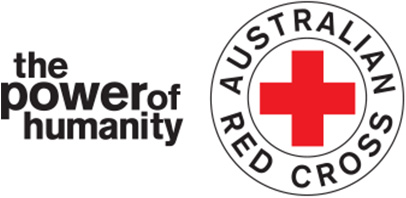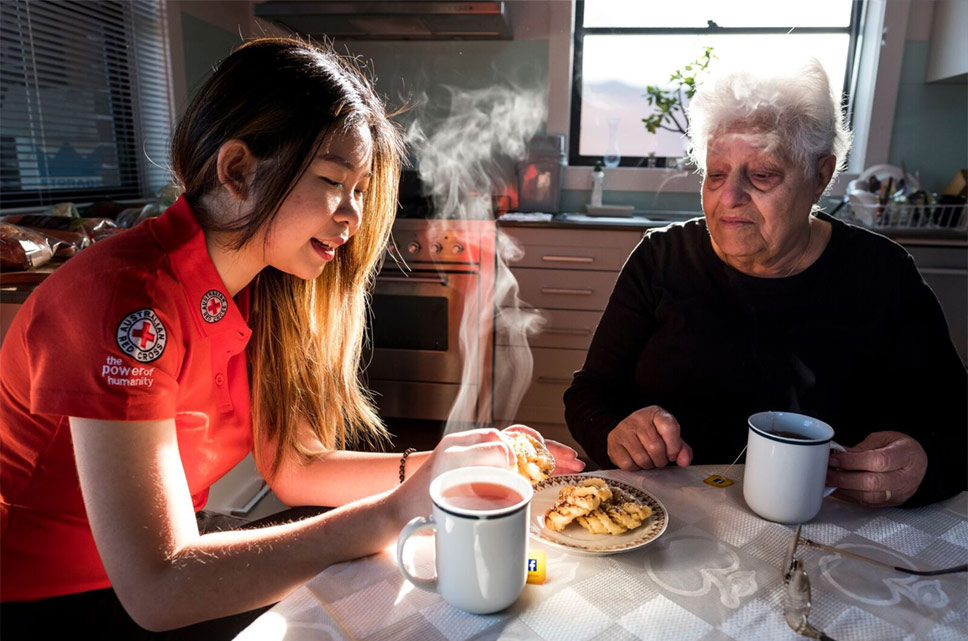
Sometimes our volunteers are the only visitors isolated and elderly people see in their day. Shared conversation and a steaming cup of tea can make a real difference. Australian Red Cross/Conor Ashleigh





Many Australians face persistent, complex challenges in accessing services, making connections or simply living safely. We aim to help them navigate those challenges.
We stand with migrants as they start their lives over, work with people in the justice system, call or visit thousands of lonely people, help young parents get a good start and young people to support each other, and work with communities to achieve the changes they want.
Connecting people to community
About 5% of Australians - or 1.35 million people - are deeply excluded from society. Our goal is to help 500,000 isolated individuals connect with their communities to overcome this exclusion.
During the year, we connected more than 30,000 people through the efforts of more than 4,000 volunteers. In New South Wales, we supported 98 young families to cope with life’s challenges through our Young Parents program. We secured safe and stable housing for 100% of young parents involved in aftercare, including 32% in private rental.
We worked with 1,116 individuals living with a disability, injury or health condition, assisting them to find 370 jobs.
Overcoming hardship
When communities live through generations of poverty and disadvantage, it’s difficult for individuals to break the cycle. That’s why we’re working with whole communities in 10 sites across Australia. We have allocated $1.2 million annually to underpin this work, ensuring a long-term commitment at each site.
What matters most is that the community drives the changes it wants. In Tiwi Islands, this was infrastructure, such as the new community hub that opened this year. In Woorabinda, Queensland, it was about opportunities for young people. We are engaging students in education, career opportunities and pathways to employment with eight students on track to complete Year 12.
With the community leading the way, we have seen a 55% decrease in the number of young Woorabinda people receiving youth justice orders. We have also supported 18 people to complete Community Service Orders and avoid prison.
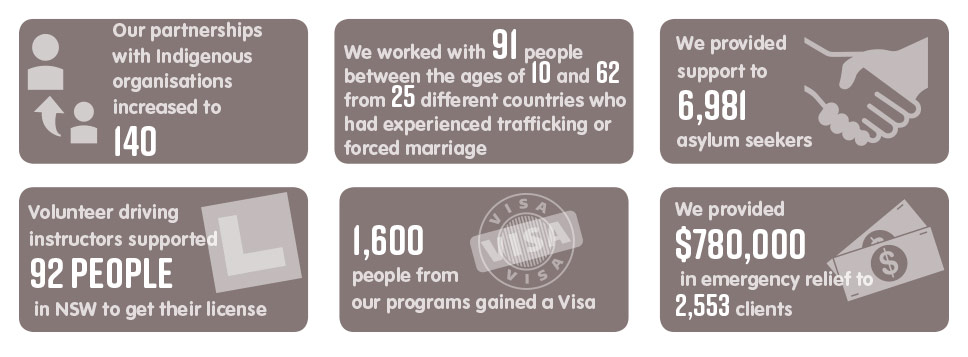
Working in partnership with First Australians
Strong connections to culture and kin, self-confidence and opportunities to succeed - these things empower young Aboriginal and Torres Strait Islander Peoples to build the future they want.
In the Northern Territory, we are working with the Galiwinku community and have supported more than 660 children to attend school and about 260 parents to engage in their child’s Yolngu and Balanda education. The program employs about 95% Indigenous staff.
The local Baby Hub provides health support to families, with 54 cooking and education classes delivered in a month. Meanwhile, a program called Save-A-Mate Our Way provides culturally appropriate activities for young Indigenous people focusing on their health and wellbeing.
With our partners in Broome, we have supported 571 young Aboriginals with activities ranging from bush camps and yarning with Elders to midnight basketball. As we continue to build an inclusive and diverse organisation, we engaged six young indigenous people under our partnership with Career Trackers and participated in the Indigenous Employee Program, which saw 20 trainees appointed. Of these, 14 completed the full 12 months with seven obtaining further employment with Red Cross.
We are at the end of year two of our Reconciliation Action Plan 2015-2018, which details practical actions guiding our reconciliation journey. Of the 32 key actions in the plan, we have completed 22 (69%). We will continue to work towards achieving the remaining actions in the next year, with a focus on increasing our Aboriginal and Torres Strait Islander Peoples employment and retention.
We are proud that currently 7% of our staff identify as Aboriginal and Torres Strait Islander Peoples.
Rethinking justice
The Australian criminal justice system entrenches disadvantage, costs $4.5 billion a year and 44% of people return to prison within two years. Our communities can be safer and stronger if we prevent vulnerable people and young people going to prison unnecessarily.
With new partners, we are seeking viable alternatives for those disproportionately impacted by the current system.
With support from the Collier Charitable Fund, we are working in Ceduna in South Australia to explore the underlying causes of offending.
Through the South Australian JUST Justice Program, 63 individuals have been helped through the court process. In New South Wales, 71 young people were diverted from the justice system, with fewer than 15% returning to custody. In Victoria, Red Cross volunteers support prisoners and their families in Port Phillip Prison’s visitor centre.
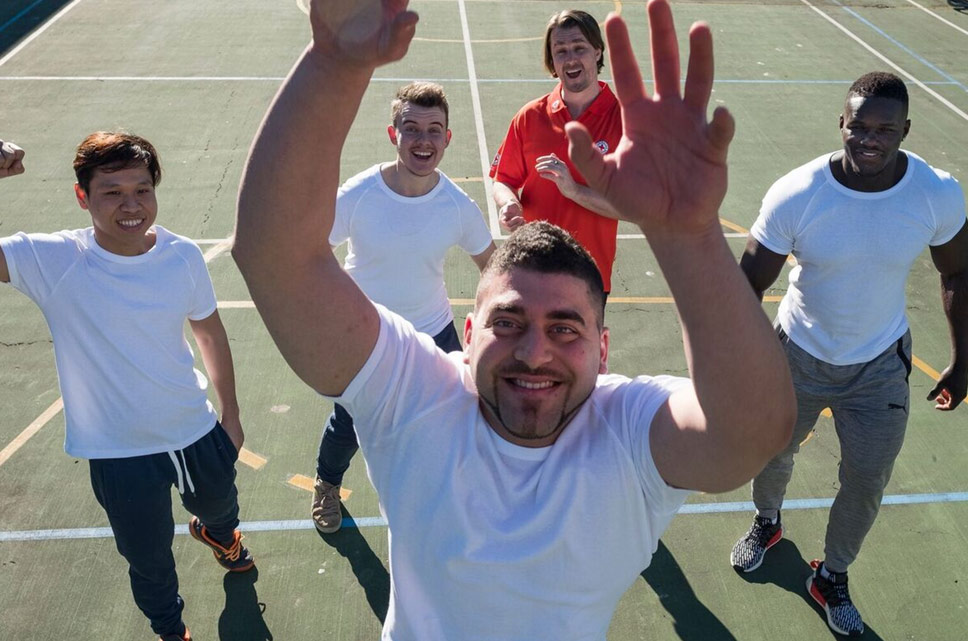
Team building exercises such as basketball help inmates foster a sense of cohesion while keeping fit and absorbing a healthy dose of sunshine. Australian Red Cross/Conor Ashleigh
Prevention is better than incarceration. Visit redcross.org.au/justicereinvest
Migrants in Transition
We are aware of the impacts of decisions on migrants in transition. We will continue to do all we can to address the humanitarian needs of people affected.
Our view is that people should never be left destitute in the Australian community. They should have their claims for protection fairly assessed and durable solutions must be found for people owed protection. We will do all we can to respond to the practical needs of people at risk of destitution.
Rebuilding lives
Our nationwide service provides specialist emergency relief to an increasing number of migrants in crisis.
This year, we helped 2,455 people with no income or access to financial support with everyday essentials like food vouchers, public transport cards and medicines.
In the coming year we will continue to support people whose claims for protection are being processed; as well as helping recent arrivals settle into their new lives, find work and volunteer opportunities, and contribute to their communities.
Starting conversations
Most Australians have never met a refugee or asylum seeker in person. That’s why we host community education sessions to share facts, dispel myths and start honest conversations.
This year volunteers presented our In Search of Safety program to 5,390 primary school students, 4,708 high school students and expanded the program to workplaces and clubs, reaching 1,816 adult participants.
Supporting trafficked people
We supported 91 people who had been trafficked, forced into marriage or exploited for their labour. The youngest was 10, the oldest was 62; they came from 25 different countries.
Human trafficking remains a hidden problem in Australia. As we support those who seek help, we also work with government and other service providers to better understand the issues and support those who have been exploited.
Separate fact from fiction about the most vulnerable in our society. Visit redcross.org.au/refugees
